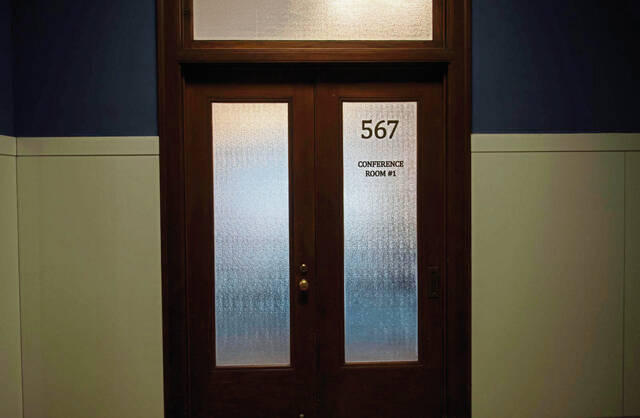A Pittsburgh City Council member has canceled a closed-doors meeting scheduled for next week following a TribLive report that such private gatherings might violate the spirit of the Sunshine Act, Pennsylvania’s open meetings law.
The session called by Councilman Bob Charland, D-South Side, had been on council’s calendar since March 15. On Monday, the same day that the TribLive report was published, Charland asked City Clerk Kimberly Clark-Baskin to cancel it.
Charland, who took office in January, said Wednesday that the cancellation was due purely to a conflict that would prevent him from attending.
The freshman councilman said that he plans to reschedule the private meeting with his colleagues about the city’s Commission on Human Relations, a civil rights organization that investigates discrimination. He described the future gathering as an “educational briefing.”
Charland declined to discuss with TribLive the concerns raised by government transparency experts about the way council has conducted its business behind closed doors.
An exclusive TribLive report Monday revealed how council has held frequent off-limits meetings for years, barring the public and often gathering in small groups deliberately to avoid a quorum.
Charland is one of two council members who have acknowledged leaving private meetings specifically to avoid a quorum.
Experts told TribLive that these private meetings seem to skirt the Sunshine Act, which aims to ensure transparency from elected officials.
At the meetings, which council calls “briefings,” members discuss a variety of public policy topics ranging from the budget to deer management.
The Sunshine Act requires public agencies to hold most meetings in public.
There are some exceptions, including meetings on personnel matters and legal issues as well as passive informational briefings that involve receiving information without deliberation.
The majority of council’s private meetings do not seem to fit into such carveouts.
Councilwoman Theresa Kail-Smith, D-West End, said Wednesday that she would support opening the closed meetings to the public.
Upcoming Local Events
“Sometimes it’s a way to hide behind our processes and not give the public full access,” she said of the private discussions. “We should have them in public.”
Having those conversations in the public eye, she said, would help constituents better understand how council makes its decisions.
“I would be very supportive of following the Sunshine laws,” she said.
Councilman Anthony Coghill, D-Beechview, said he will not attend upcoming private meetings if there are still questions about potential Sunshine Act issues.
Related:
• Pittsburgh City Council's private meetings raise questions about Sunshine Law compliance
No other private meetings are currently listed on council’s calendar, which appears online. Last year, council had 28 closed-door sessions. There have been 10 so far this year.
Coghill said he feels the closed-doors meetings can be “productive” for council members but said opening them to the public would “not necessarily” change that.
“We should look at it, and we should make sure we’re not skirting any laws,” Coghill said. “If we are, then we need to cease.”
Councilman Khari Mosley, D-Point Breeze, said he has found council’s private meetings “to be very helpful to the legislative process” but acknowledged that “prioritizing openness and transparency is crucial to maintaining the public trust.”
“I am committed to finding ways we can remain in compliance with the Sunshine Act, while ensuring council is well-informed as we set policy,” he said.
Council President R. Daniel Lavelle on Wednesday said he felt City Council was in “strong compliance” with the Sunshine Act and did not violate the spirit of the law.
He acknowledged there may be a need for more specificity in how the topics of briefings are described for the public, but said he felt council was within its rights to continue having such private sessions.
“I think it’s appropriate for members to be able to gather — as long as we’re not having a quorum — to have discussion, to get educated,” Lavelle said.
Melissa Melewsky, media law counsel for the Pennsylvania NewsMedia Association, said it seems council is deliberately avoiding a quorum to avoid violating the letter of the law.
Featured Local Businesses
“Intentionally avoiding a quorum to intentionally avoid transparency is bad public policy and may give rise to potential liability under the law,” she said. “The law presumes agencies are acting in good faith. There’s an argument to be made that intentionally avoiding a quorum to avoid the Sunshine Act is not acting in good faith.”
Lavelle said he felt council’s closed-door meetings were acceptable under the law because they did not include what he considered to be deliberations. He said council members weren’t discussing “how you’re going to make a decision,” which was his definition of deliberating.
Melewsky, however, said the Sunshine Act provides a broader definition of deliberation that would include most discussions.
“The Sunshine Act defines deliberation as the discussion of agency business held for the purpose of making a decision,” she said. “The definition is broad because the law intends that most discussions of agency business be held in a public forum. That’s the core purpose of the law — to throw open the doors of government to the community.”
She also pushed back on Lavelle’s claim that council could meet to discuss a broad array of topics in “working sessions” that weren’t required to be held publicly. Under the Sunshine Act, working sessions are meant only for elected boards of auditors, she said.
Other council members either declined to comment or did not immediately respond to requests for comment Wednesday.
City Council Solicitor Dan Friedson said he is sending all council members information about free training on the Sunshine Act hosted by the state Office of Open Records in response to TribLive’s recent reporting. He recommended all elected officials take such training.
Friedson has acknowledged that at least some of council’s private meetings should be open to the public.
He said council doesn’t need to make a new rule book for how to hold their meetings — members simply need to abide by the existing laws.
“I don’t really see a need to do anything other than [follow] the Sunshine Act,” he said. “It’s pretty clear. It’s not difficult to figure out.”
Upcoming Local Events
Friedson, citing attorney-client privilege, said that he could not divulge what he has discussed with council members regarding concerns that the meetings could skirt the spirit of the Sunshine Act.
But he said elected officials should not try to dodge laws meant to ensure good government practices.
“It’s unfortunate that the brand of Pittsburgh politics is to be clever rather than transparent,” he said.
Julia Felton is a TribLive reporter covering Pittsburgh City Hall and other news in and around Pittsburgh. A La Roche University graduate, she joined the Trib in 2020. She can be reached at jfelton@triblive.com.


